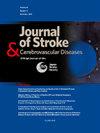新TIA和轻微缺血性卒中试验(POINT)人群中血小板导向抑制的他汀类药物起始和早期卒中复发
IF 1.8
4区 医学
Q3 NEUROSCIENCES
Journal of Stroke & Cerebrovascular Diseases
Pub Date : 2025-05-15
DOI:10.1016/j.jstrokecerebrovasdis.2025.108349
引用次数: 0
摘要
他汀类药物治疗在降低缺血性卒中长期风险方面的益处已得到证实,但他汀类药物治疗对初始缺血性事件后早期卒中复发风险的直接保护作用尚未确定。方法在对POINT数据的二次分析中,我们评估了他汀类药物对早期卒中复发(7天内)和90天以上复发的影响。我们还使用logistic和比例风险模型检验了在指数事件之前未使用他汀类药物的受试者亚组中早期开始使用他汀类药物的影响。结果在POINT试验中,267例缺血性卒中患者中有175例(65.5%)早期(7天内)复发。在校正后的logistic回归分析中,研究开始时基线他汀类药物治疗与早期缺血性卒中复发的几率降低相关(OR 0.70, 95% CI 0.50-0.99, P = 0.04),而在校正后的Cox比例风险分析中,这种影响仅具有边际显著性(HR 0.72, 95% CI 0.52-1.01, P = 0.05)。在基线时未服用他汀类药物的受试者亚组中,开始他汀类药物治疗对早期卒中复发没有显著的保护作用(调整后HR 0.80, 95% CI 0.54-1.20, P = 0.28)。结论:在POINT试验人群中,既往接受他汀类药物治疗与卒中早期复发几率降低有轻微相关性。然而,开始他汀类药物治疗在降低早期卒中复发风险方面没有可检测到的效果。POINT试验没有证据表明他汀类药物对早期中风复发有直接的保护作用。本文章由计算机程序翻译,如有差异,请以英文原文为准。
Statin initiation and early stroke recurrence in the Platelet-Oriented Inhibition in New TIA and Minor Ischemic Stroke Trial (POINT) trial population
Background
Benefits of statin therapy in reducing the long-term risk of ischemic stroke are well-established, but the immediate protective effect of statin therapy on risks of early stroke recurrence after an initial ischemic event are not established.
Methods
In this secondary analysis of POINT data, we evaluated the effects of statins on early stroke recurrence (within 7 days) and recurrence over 90 days. We also examined the effect of early statin initiation in the subgroup of subjects not on statins prior to the index event, using logistic and proportional hazards models.
Results
In the POINT trial, 175 of 267 (65.5 %) of ischemic stroke recurrences were early (within 7 days). Baseline statin treatment at the time of study entry was associated with decreased odds of early ischemic stroke recurrence in adjusted logistical regression analysis (OR 0.70, 95 % CI 0.50–0.99, P = 0.04), an effect only marginally significant in adjusted Cox proportional hazard analyses (HR 0.72, 95 % CI 0.52–1.01, P = 0.05). In the subset of subjects not taking statin medications at baseline, initiation of statin treatment had no significant protective effect against early stroke recurrence (adjusted HR 0.80, 95 % CI 0.54–1.20, P = 0.28).
Conclusions
In the POINT trial population, prior treatment with statin was marginally associated with decreased odds of early recurrence of stroke. However initiating statin treatment had no detectable effect in reducing risk of early stroke recurrence. The POINT trial provides no evidence for an immediate protective effect of statin initiation against early stroke recurrence.
求助全文
通过发布文献求助,成功后即可免费获取论文全文。
去求助
来源期刊

Journal of Stroke & Cerebrovascular Diseases
Medicine-Surgery
CiteScore
5.00
自引率
4.00%
发文量
583
审稿时长
62 days
期刊介绍:
The Journal of Stroke & Cerebrovascular Diseases publishes original papers on basic and clinical science related to the fields of stroke and cerebrovascular diseases. The Journal also features review articles, controversies, methods and technical notes, selected case reports and other original articles of special nature. Its editorial mission is to focus on prevention and repair of cerebrovascular disease. Clinical papers emphasize medical and surgical aspects of stroke, clinical trials and design, epidemiology, stroke care delivery systems and outcomes, imaging sciences and rehabilitation of stroke. The Journal will be of special interest to specialists involved in caring for patients with cerebrovascular disease, including neurologists, neurosurgeons and cardiologists.
 求助内容:
求助内容: 应助结果提醒方式:
应助结果提醒方式:


